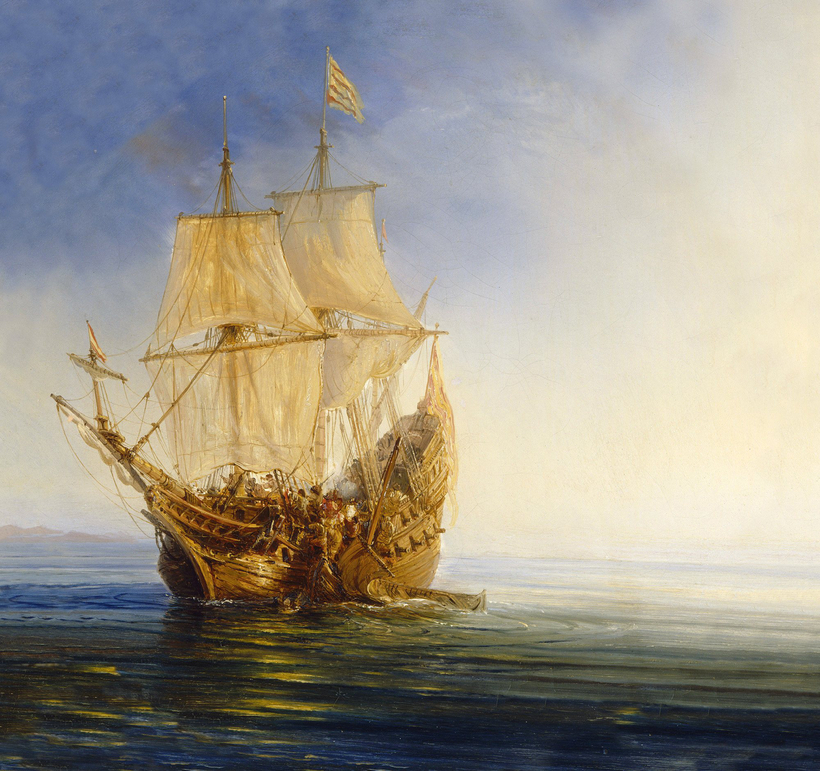One night in May of 1694, the captain of the English expeditionary ship Charles II was awakened by the sound of cannon fire. He was surprised to feel rolling waves beneath him—his ship was supposed to be safely docked in a Spanish port. Rushing to the quarterdeck, he found his first mate, a man from Devonshire named Henry Every, who explained that the ship had cut anchor and gone to sea. “At sea!” said the bewildered captain. “How can that be?” Every’s answer was to the point: “I am captain of the ship now, and this is my cabin.”
He was three centuries ahead of Tom Hanks’s Somali captor in the film Captain Phillips—“Look at me, I’m the captain now!”—but his essential message was the same: Every was now a pirate, and the vessel, fast on the water and outfitted with 46 guns, was now his pirate ship.
Re-christening the stolen ship as the Fancy (and sending the old captain ashore in a leaky boat), Every and his crew proceeded to sail thousands of miles, around the Horn of Africa to the Indian Ocean. Off the western coast of India, they launched a brutal attack on the Gunsway, a giant treasure ship of the Mughal Empire, terrorizing its passengers with barbaric violence. Accounts of their crimes were so shocking, they threw India and England into a geopolitical crisis that would permanently alter the global economy.
The E.I.C. in Infancy
Today, Every lacks the renown of a Captain Kidd or a Blackbeard, but at the turn of the 18th century he was the most hunted, and most celebrated, pirate in the world. In Enemy of All Mankind, his engrossing and deftly crafted new book, Steven Johnson convincingly places Every at a hinge point in history. The author of 11 other books and the host of the BBC/PBS series How We Got to Now, Johnson excels at collapsing the gap between our world and the distant past. Telling the story of the Fancy’s raid on the Gunsway and Every’s successful subsequent trans-oceanic escape from justice, Johnson finds such modern phenomena as the global manhunt, the celebrity trial, and the rapacious multi-national corporation all in infant form. Most significantly, he draws a convincing line from Every’s acts to the muscling up of the East India Company, a development that would fast lead to Britain’s brutal domination of South Asia.
Every was now a pirate, and the vessel, fast on the water and outfitted with 46 guns, was now his pirate ship.
This was an improbable C.V. for Every, a Devonshire-born commoner who apparently worked the high seas for decades without ever inviting the world’s attention. But fame found him on the day in September 1695 when he set his sights on the Gunsway. In its hull, Johnson writes, the ship held “astounding quantities of gold and silver, along with jewels, ivory, myrrh, frankincense, saffron, and other delights.” The ship also contained a number of high-born Indians with close ties to the Mughal emperor Aurangzeb. Contemporaneous accounts described the Fancy setting on the ship with unimaginable brutality—murdering, raping, and dismembering passengers and crew. “Several honorable women,” wrote one chronicler, “threw themselves into the sea to preserve their chastity, and some others killed themselves with knives and daggers.”
Outraged by reports of this evil English ship, Indian officials held its mother country responsible. They ordered the imprisonment of Englishmen inside the East India Company’s factory in the port city of Surat and threatened to expel the company from their country altogether. Frightened at losing its grip on India’s riches, the company lunged to propose an alternative: England would bring the pirates to justice. Further, the East India Company would guarantee the future safety of Mughal ships by taking on the policing of the Indian Ocean itself. From this sprang a new role for the East India Company as a quasi-military power, a power that would soon enough bring the whole subcontinent under its heel.
Beware the Dread Pirate Every
Catching Henry Every proved a tougher challenge. After ditching the Fancy in the Bahamas, Every sailed in a small boat for Northern Ireland, where he disappeared. Though eight members of the Fancy’s crew were eventually caught and brought to London, where six were tried and five hanged by the Thames, the ship’s captain was never found.
Johnson alerts us at the outset that in order to capture the cultural and economic significance of Every’s story, he must “break out of the boundaries of period histories and traditional biographies” and “jump around in time.” This can be a tricky business—writers of narrative history are perennially seduced by tangents disguised as essential context. Readers are often the losers in this exchange—fill your Lizzie Borden biography with too much history of Old Fall River and they start longing for the ax.
Happily, Johnson’s roving mind is paired with a disciplined pen. Swooping up out of Every’s story he dips into topics as varied as the animalizing of cotton fibers, the history of London’s Old Bailey, and the origins of the phrase “Hitting the head.” But he doesn’t dally; we get precisely enough on, say, the “Sea Peoples” of the Late Bronze Age to feel virtuously edified before Johnson plops us back down on the Fancy’s deck just in time for the guns to boom.
This approach especially suits Every, about whom little is known beyond accounts from the trial of the Fancy’s crew. Other chroniclers have used speculation or invention to fill the gaps, but by leaving his protagonist a bit blank, Johnson helps his case for the pirate’s significance. It would be too much to attribute the tectonic shifts that followed the Fancy’s journey to the talent or ambition of a single man. Rather, as Johnson notes, the new world made from the West’s brutal advance into the East was already emerging when Every first assumed his ship’s command. He was the captain, but his course was guided by forces far greater than he understood.
Jonathan Darman is the author of Landslide: LBJ and Ronald Reagan at the Dawn of a New America and a forthcoming biography of Franklin Roosevelt


